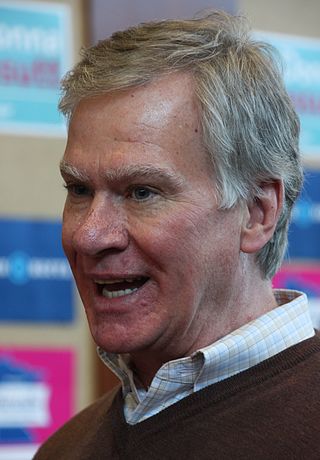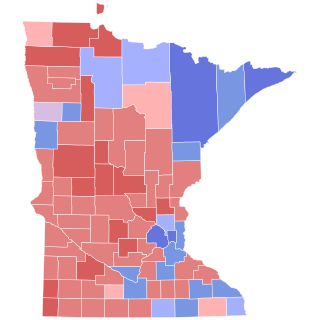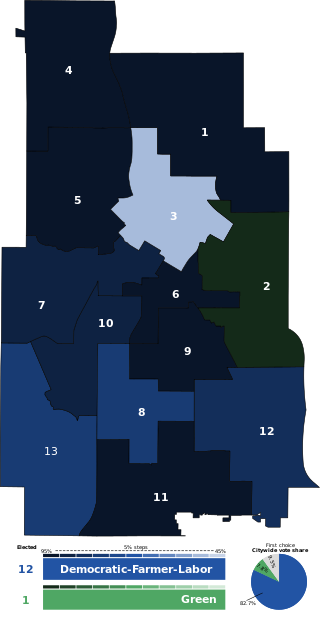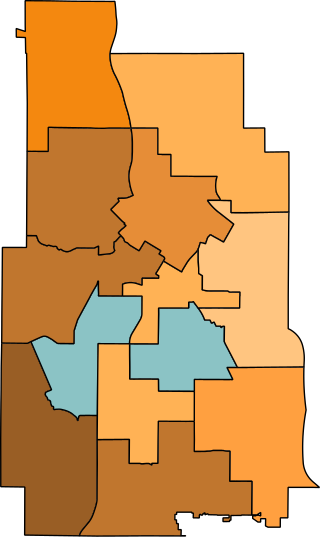
Christopher B. Coleman is an American politician and lawyer who served as the 54th Mayor of Saint Paul, Minnesota between 2006 and 2018. He defeated incumbent mayor Randy Kelly in 2005 and took office on January 3, 2006. He was later succeeded by city councilman Melvin Carter on January 2, 2018.

The 2009 election for Mayor of New York City took place on Tuesday, November 3. The incumbent Mayor, Michael Bloomberg, an independent who left the Republican Party in 2008, won reelection on the Republican and Independence Party/Jobs & Education lines with 50.7% of the vote over the retiring City Comptroller, Bill Thompson, a Democrat, who won 46.3%. Thompson had won the Democratic primary election on September 15 with 71% of the vote over City Councilman Tony Avella and Roland Rogers. This was the fifth straight mayoral victory by Republican candidates in New York despite the city's strongly Democratic leaning in national and state elections.

The 2008 Minnesota U.S. House of Representatives elections took place on November 4, 2008. All 8 congressional seats that make up the state's delegation were contested. Representatives were elected for two-year terms; those elected served in the 111th United States Congress from January 4, 2009, until January 3, 2011.

The 2010 Minnesota gubernatorial election was held on Tuesday, November 2, 2010, to elect the 40th Governor of the U.S. state of Minnesota for a four-year term to begin in January 2011. The general election was contested by the major party candidates State Representative Tom Emmer (R–Delano), former U.S. Senator Mark Dayton (DFL), and Independence Party candidate Tom Horner. After a very close race, Dayton was elected governor. Emmer would be elected to the United States House of Representatives four years later.
A general election was held in Minneapolis on November 3, 2009. Minneapolis's mayor was up for election as well as all the seats on the City Council, the two elected seats on the Board of Estimate and Taxation, and all the seats on the Park and Recreation Board. This was the first election held in Minneapolis that used ranked choice voting, a collective term for instant-runoff voting and the single transferable vote.

Gary Schiff is an American politician and activist who represented Ward 9 on the Minneapolis City Council. A member of the Minnesota Democratic-Farmer-Labor Party (DFL), he was first elected in 2001 and re-elected in 2005 and 2009. Prior to his political career, Schiff was involved with a variety of activist groups and causes ranging from human rights with the Human Rights Campaign, to historic preservation with Save Our Shubert.

The 2012 United States House of Representatives elections in Minnesota were held on Tuesday, November 6, 2012, to elect the eight U.S. representatives from the state of Minnesota. The elections coincided with the elections of other federal and state offices, including a quadrennial presidential election and an election to the U.S. Senate. Primary elections were held on August 14, 2012.

The 2014 Minnesota gubernatorial election took place on November 4, 2014, to elect the governor of Minnesota concurrently with the election to Minnesota's Class II U.S. Senate seat, as well as other elections to the United States Senate in other states and elections to the United States House of Representatives and various state and local elections.

The 2013 Minneapolis mayoral election was held on November 5, 2013, to elect the mayor of Minneapolis for a four-year term. This was the second mayoral election in the city's history to use instant-runoff voting, popularly known as ranked choice voting, first implemented in the city's 2009 elections. Municipal elections in Minnesota are nonpartisan, although candidates are able to identify with a political party on the ballot. After incumbent Mayor R. T. Rybak announced in late 2012 that he would not seek a fourth term, 35 candidates began campaigns to replace him. Many of these candidates sought the endorsement of the Minneapolis unit of the Minnesota Democratic–Farmer–Labor Party (DFL), though the convention ultimately ended with no endorsement.

The 2013 Minneapolis City Council elections were held on November 5, 2013, to elect the 13 members of the Minneapolis City Council for four-year terms. 10 races produced a winner in the first round and the remaining three in the second round. Candidates affiliated with the Minnesota Democratic–Farmer–Labor Party (DFL) won all 12 of the seats where they had fielded a candidate, and the Green Party of Minnesota won the remaining one seat.
A general election was held in Minneapolis on November 5, 2013. Minneapolis's mayor was up for election as well as all the seats on the City Council, the two elected seats on the Board of Estimate and Taxation, and all the seats on the Park and Recreation Board. Voters were able to rank up to three candidates for each office in order of preference.

The 2009 Minneapolis City Council elections were held on November 3, 2009 to elect the 13 members of the Minneapolis City Council for four-year terms. Candidates affiliated with the Minnesota Democratic–Farmer–Labor Party (DFL) won 12 seats and the Green Party of Minnesota one seat.

John M. Quincy is an American politician and marketing consultant living in Minneapolis. From 2010–2018, he served two terms on the Minneapolis City Council as a representative of the city's 11th Ward. Quincy moved to Minneapolis in 1994 and sought the endorsement of the Minnesota Democratic–Farmer–Labor Party (DFL) in 2006 for a seat on the Minneapolis Board of Education which he did not receive. He won both the DFL's endorsement and the 2009 City Council election and served as the head of several committees. He has also acted as a member of the Minneapolis–Saint Paul International Airport's Noise Oversight Committee.

The 2018 Minnesota gubernatorial election took place on November 6, to elect the 41st Governor of Minnesota as incumbent Democratic (DFL) Governor Mark Dayton chose not to run for re-election for a third term. The Democratic nominee was U.S. Representative Tim Walz from Minnesota's 1st congressional district while the Republican Party nominated Hennepin County commissioner Jeff Johnson for a second consecutive time. The Independence Party of Minnesota did not field a candidate for the first time since 1994. Going into the election polls showed Walz ahead; the race was characterized as lean or likely DFL.

The 2017 Minneapolis mayoral election was held on November 7, 2017, to elect the Mayor of Minneapolis. This was the third mayoral election in the city's history to use ranked-choice voting. Municipal elections in Minnesota are nonpartisan, although candidates were able to identify with a political party on the ballot.
A general election was held in Minneapolis on November 7, 2017. Minneapolis's mayor was up for election as well as all the seats on the City Council, the two elected seats on the Board of Estimate and Taxation, and all the seats on the Park and Recreation Board. Voters were able to rank up to three candidates for each office in order of preference.

The 2017 Minneapolis City Council election was held on November 7, 2017, to elect the members of the Minneapolis City Council. The political composition remained unchanged, with the Minnesota Democratic–Farmer–Labor Party (DFL) retaining 12 seats and the Green Party of Minnesota one seat. Three DFL incumbents were defeated by intraparty opponents. The new City Council convened on January 8, 2018.

A mayoral election was held on November 2, 2021, to elect the mayor of the U.S. city of Minneapolis. Incumbent DFL mayor Jacob Frey won reelection to a second term, becoming the first Minneapolis mayor to win a second term since R. T. Rybak in 2005. Minneapolis mayoral elections use instant-runoff voting, also known as ranked-choice voting. All candidates appear on the same ballot and there is no primary election, nor is there a runoff. Minneapolis's twin city, Saint Paul, also held a mayoral election on the same day, using the same system.

Beginning shortly after the city's incorporation as a city in 1846, elections have been held in the mayor of Manchester, New Hampshire. The following article provides information on the elections for mayor in the city during the 21st century.

Elections are held every four years in the off-year immediately after United States presidential election years in Albany, New York, to elect the city's mayor.




















